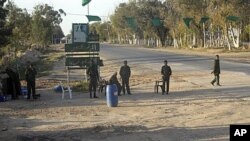The World Food Program has started moving food assistance by land into parts of western Libya heavily affected by fighting for the first time since violence between the government and protesters began two months ago.
The World Food Program reports a convoy of eight trucks loaded with wheat flour and high-energy biscuits crossed into western Libya on Monday. WFP says these supplies are enough to feed nearly 50,000 people for 30 days.
WFP spokeswoman Emilia Casella says earlier this week, the agency signed an operational agreement with the Libyan Red Crescent to coordinate the delivery and distribution of food assistance to the areas facing food shortages.
"WFP is coordinating with all of the parties on the ground to ensure that affected civilian population does not go hungry irrespective of their area’s adherence to any of the warring factions," she said.
Casella says WFP also will be delivering food to people in need of assistance in the capital, Tripoli, which is under the control of Libyan leader Moammar Gadhafi.
She says the World Food Program delivered a one-month supply of food on April 7 to 40,000 people in the rebel-controlled port city of Misrata, which is under siege by pro-Gadhafi forces.
"Now, we are trying to deliver it in other parts of the country where people need assistance. And, at this stage, we have managed to get in food for 50,000 people and we will continue to try to get in food to all the areas including back to Misrata if we can," said Casella.
Meanwhile, the U.N. Children’s Fund says a ship carrying medical supplies for 15,000 to 25,000 people is expected to dock in Misrata on Wednesday. A UNICEF spokeswoman, Marixie Mercado, says supplies include first aid kits, drinking water, water purification tablets, and hygiene items.
"It is now 50 days into the fighting in Misrata and the full picture of the toll on children is emerging - and it is far worse than we had feared, and certain to get worse unless there is a cease-fire," she said. "We have at least 20 verified child deaths and many more injuries due to shrapnel from mortars and tanks and bullet wounds. The youngest victim was nine months old and most of those who have been killed in the past two weeks were younger than 10."
Mercado says many children are traumatized by the conflict. She says many have limited access to water, food and other essential needs.
WFP Delivers Food to Western Libya




